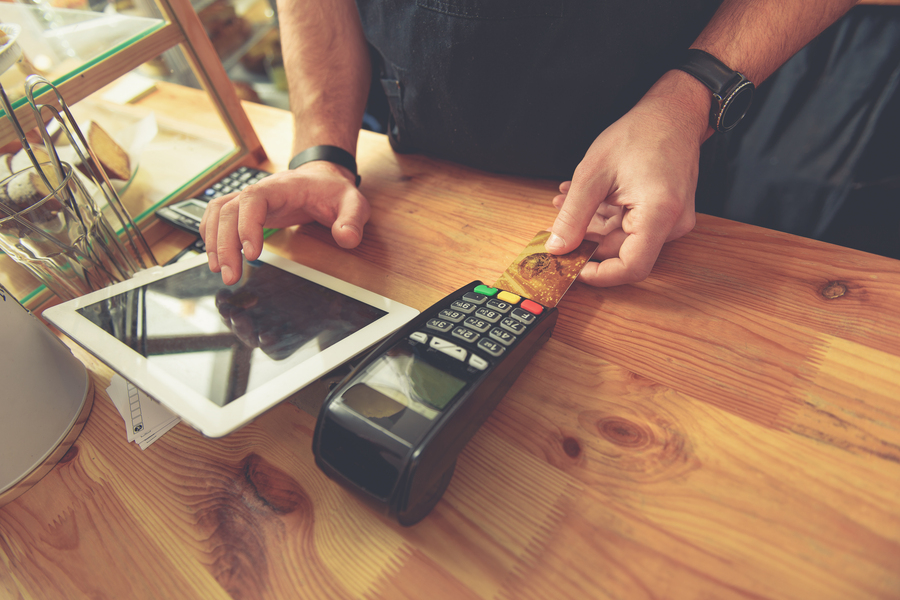Cash may once have been king, but in today’s marketplace, plastic reigns supreme. Small businesses must adapt to customers’ payment preferences to stay competitive. Understanding the kaleidoscope of card payment solutions is crucial to selecting the most cost-effective option that matches business needs.
From swiping to tapping, businesses are now faced with an array of card payment machines, each boasting different features and price points. Determining which machine offers the best value involves scrutinising factors such as compatibility, transaction fees, and user experience.
In this comprehensive guide, we’ll dissect the perks and pitfalls of various card payment methods, explore the burgeoning world of mobile card readers, and navigate the labyrinth of contactless payments. We aim to arm small business owners with the knowledge to choose the right card payment solution, keep costs in check, and customise their setup for optimal efficiency.
Choosing the Right Card Payment Solution for Your Business
When it comes to selecting the right card payment solution for your business, there is a balance to be struck between cost and functionality. Small businesses and sole traders, in particular, may gravitate towards more affordable options. A card machine like the SumUp Air, for instance, offers advanced features such as portability and contactless payments at a relatively low entry price of £39, making it an attractive option for those on a budget.
Businesses looking for the most cost-effective means to accept card payments typically find that a monthly contract with a merchant service provider checks many boxes. Whether you require a countertop, portable, or mobile card machine, these contracts can offer a variety of credit card machines to suit different operational needs.
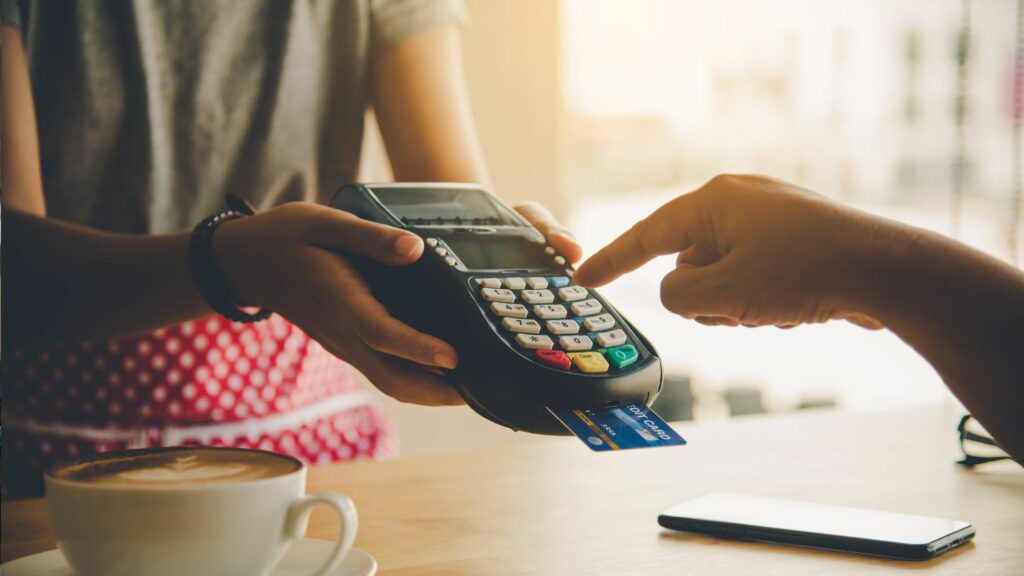
The choice of a suitable card machine heavily depends on the specifics of your business. A countertop device might be ideal for permanent checkout locations, whereas portable options are better suited for businesses that need the flexibility to take payments from various locations within a venue. For the utmost in convenience and low upfront costs, app-based card machines such as the Zettle Reader, SumUp Air, and Square Reader are increasingly popular. They pair with a mobile device via Bluetooth, avoiding long-term contractual commitments.
Payment processing companies like Square, Zettle, and SumUp offer a streamlined approach to handling transactions and ensuring compliance, especially for sole traders and limited companies, eliminating the need for a traditional merchant account.
Factors to Consider When Choosing a Card Payment Solution
Card machines today come in various styles and capabilities, making them adaptable to many business environments, from bustling retail shops to itinerant market vendors. When deciding on a card machine, consider the supported payment methods—magnetic stripe, chip and PIN, and contactless payments—as well as how swiftly transactions can be processed.
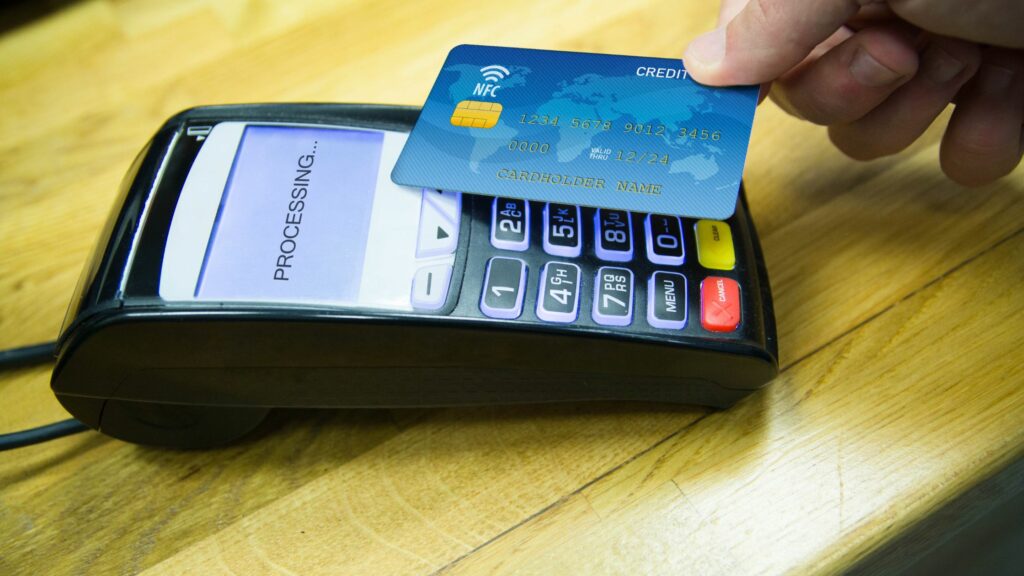
Choosing a card reader without monthly fees and long-term commitments might be beneficial for sole proprietorships or newly minted enterprises. This offers flexibility and reduces overhead if the business’s payment frequency and volume remain uncertain.
Moreover, the optimum card payment machine for a small business revolves around the owner’s priorities. App-based machines like the Zettle Reader or SumUp Air might be the best bet for cost-conscious business owners who also value mobility.
Watch the fine print regarding credit and debit card transaction fees when sifting through options. These fees vary from provider to provider, and comparing them is essential to ensure you’re getting a cost-effective deal for your payment processing needs.
Comparing Different Card Payment Solution Providers
Card payment providers differ in their contract offerings, which range from pay-as-you-go to extended 1-5-year contracts. These agreements are worth scrutinising to find what works best for your type of business and projected transaction volume.
Service level agreements (SLAs) add another layer for consideration. The level of support can vary widely—from basic business hour support to more comprehensive 24/7 assistance. Depending on your business model, you might require different levels of customer service.
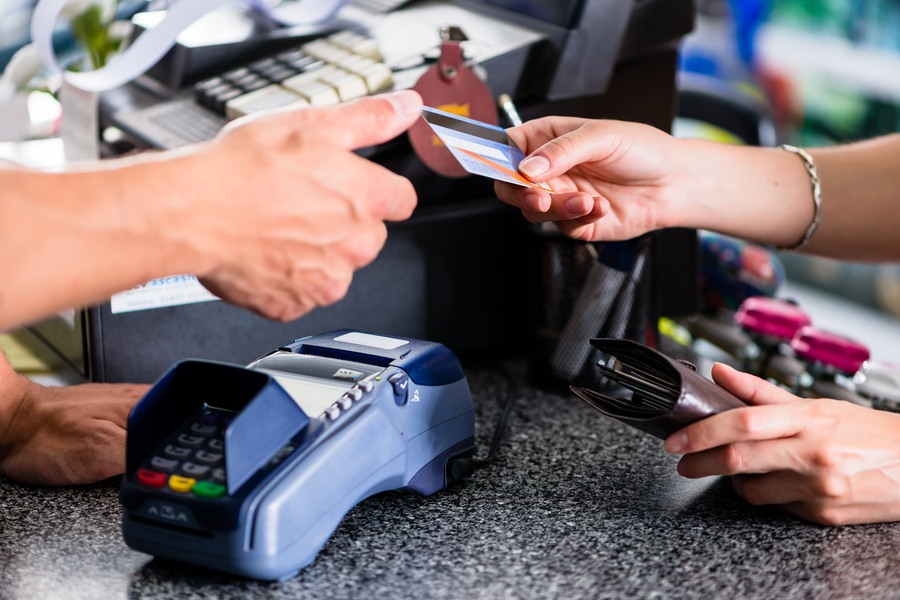
Price-wise, providers like Worldpay and Takepayments might offer a monthly terminal hire that averages around £20 and could encourage lower transaction rates, some dipping as low as 0.3% for certain card types. Conversely, providers such as Tide and Dojo might present higher upfront costs for card machines but compensate with lower transaction fees compared to Square and Zettle—this can be more economical in the long run with every sale made.
Each provider also equips their hardware with software that caters to different business needs. Touchscreen terminals like the PAX A920 boast diverse POS functionalities, ranging from basic payment processing to advanced operations, including product libraries. It’s worth investigating each provider’s offerings to match your business requirements.
| Provider | Type of Contract | Terminal Hire Fee | Transaction Fees | POS Features |
|---|---|---|---|---|
| Worldpay | Monthly | £20 | As low as 0.3% | Basic to Advanced |
| Takepayments | Monthly | £20 | Low | Basic to Advanced |
| Tide | No Contract | N/A | Low | Basic to Advanced |
| Dojo | No Contract | Higher than Tide | Low | Advanced |
| Square | No Contract | N/A | Varies | Basic to Advanced |
| Zettle | No Contract | N/A | Varies | Basic to Advanced |
Before opting for a particular provider, cross-reference your business’s needs with what’s on offer to ensure a secure, efficient, and profitable card payment system for your enterprise.
Costs and Fees
When implementing a card payment solution for a business, understanding the associated costs and fees is crucial. The price of accepting credit card payments can be broken down into a few key areas: payment processing fees, equipment costs, account maintenance fees, and additional charges.
Payment processing fees are usually the most prominent expense, typically a percentage of the transaction value. They can range widely, from 1.5% to 3% or more, influenced by factors such as the transaction type and the card used—credit or debit. For example, American Express transactions often incur higher fees than other credit cards.
Business owners also need to consider equipment costs. The price of credit card machines varies depending on functionality, with basic countertop models priced around £40 to £160. However, businesses requiring more advanced features may find themselves facing costs exceeding £1,000.
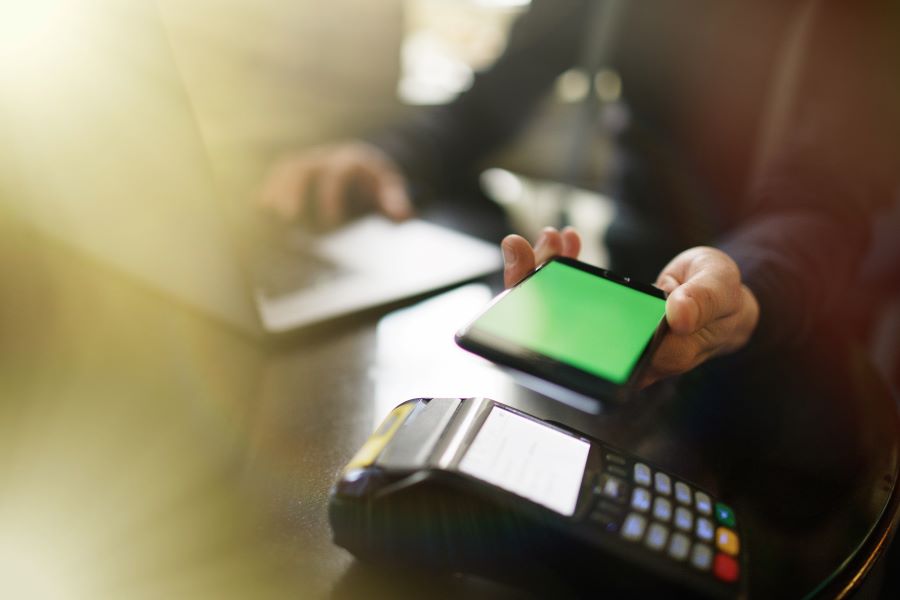
Monthly account fees are another financial aspect to consider. These fees vary by provider and can range from £9.95 + VAT to £75 + VAT per month. They may cover various services such as account maintenance, customer support, and access to additional features like digital receipts or virtual terminals.
Furthermore, providers may charge setup fees to get your card payment system running. Some businesses choose pay-as-you-go systems like the SumUp Air or Square Reader to avoid monthly fees, paying only per transaction.
Small businesses often aim to keep costs low while maintaining the flexibility to adapt as the business grows. Thus, it is pivotal to analyse and understand the full cost structure of any given provider before committing to their services.
Understanding the Different Types of Card Payment Solutions
Delving deeper into card payment solutions, there are three primary types of card payment machines tailored to specific business environments. Countertop machines are the stalwarts of card payments, sitting firmly at payment counters and serving businesses with fixed payment locations, such as small retail stores. They require a direct power source and a static connection to the internet or a phone line to process payments.
On the other hand, portable card machines break free from the constraints of wires, using Wi-Fi or Bluetooth to connect to broader payment systems while allowing mobility within the establishment. This flexibility makes it perfect for businesses like restaurants or cafés where the checkout process can come to the customer.
The most agile of the trio are mobile card payment machines, which, with the aid of a built-in SIM card or connection to a mobile phone network, enable payments beyond the physical confines of a business. Often utilised by tradespeople, market vendors or any business that offers offsite services, these devices accommodate the need for transactions at various locations.
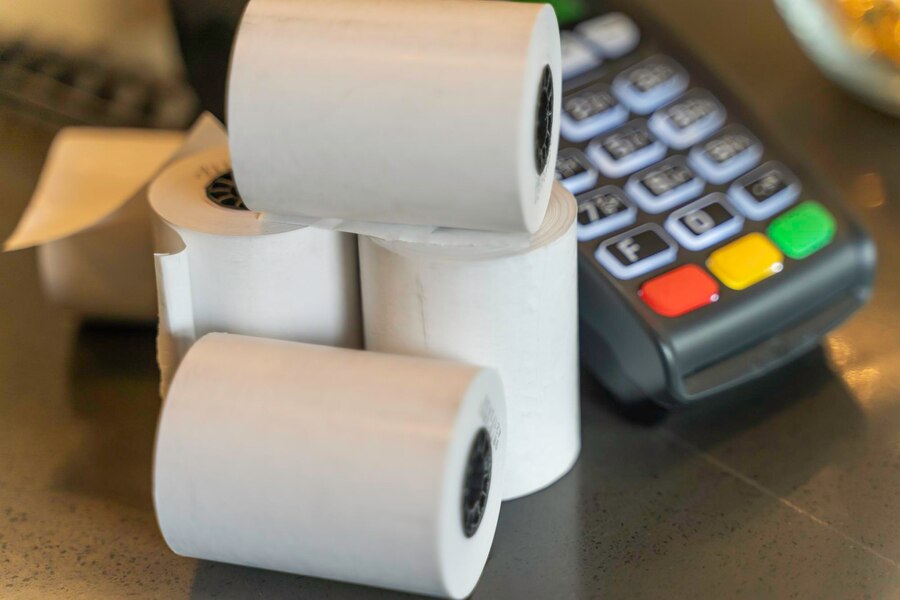
Modern card machines boast a wide range of features such as the ability to process contactless payments, including the use of NFC technology for mobile phone and contactless card taps. These machines ensure transactional security and meet customer expectations for quick and hygienic payment methods.
For businesses contemplating which type of card machine would best suit their operations, it’s crucial to consider the customer experience as well as the nature of the transactions. The chosen card payment machine should enhance the efficiency of the payment process while also offering customers a variety of payment options.
Pros and Cons of Different Card Payment Solutions
Barclays, known for its financial services, offer both pay-as-you-go card readers and monthly contract options catered to a business’s scale and payment volume. However, customers have reported issues related to the connectivity and app functionality of their entry-level card readers, which might deter some business owners. That aside, Barclays’ role as an acquiring bank might offer leverage for businesses to negotiate better rates, enhancing the potential for bespoke processing fees tailored to individual business needs.
Online and Mail Order/Telephone Order (MOTO) payment integration is another facet where Barclays shines, allowing the inclusion of virtual terminals and payment gateways to facilitate diverse transaction types, including online payments and transactions made via mail or phone.
Revolut has stepped into the card machine arena with the Revolut Reader, a sleek device pushing the envelope in terms of secure and speedy transactions. While this machine offers businesses a foray into the innovative banking solutions that Revolut is renowned for, it presently does not support American Express, which could be a limitation for businesses whose customers predominantly use this type of card.
SumUp Air readers are celebrated for their robust security measures. These devices assure that transactions are safeguarded by transferring encrypted data alone to their encrypted payment servers. Sensitive customer information isn’t stored on either the card reader or connected mobile devices, thus aligning with the highest security standards recognised in the industry. This security-focused approach provides peace of mind for both the business owner and the customer, making it an attractive option for those prioritising data protection.
When considering the pros and cons of the various card payment solutions available, business owners must balance factors such as cost, flexibility, security, and customer payment preferences. A business’s choice in card payment solution can make a significant impact on the daily operations and financial health of the establishment, warranting careful consideration of the features, benefits, and potential drawbacks of each option.
Card Payment Machines
Card Payment Machines serve a vital role in modern commerce, enabling businesses of all sizes to process customer payments efficiently. Whether a local café or a bustling retail center, the right card machine not just facilitates transactions but also enhances customer satisfaction by offering a variety of payment methods.
Key amongst their capabilities is the support for Chip and PIN transactions, as well as the increasingly popular contactless payments, which include NFC technology to enable taps from contactless cards and mobile phone wallets. This versatility ensures businesses can cater to the payment preferences of a diverse customer base.
Exploring Various Card Payment Machine Options
There are several options to consider when it comes to selecting the right card payment machine for a business:
Countertop Card Machines: Ideal for businesses with a fixed location, these machines offer reliability and a full range of payment options. They typically require a wired internet or phone connection, which ensures a steady and secure processing service.
Portable Card Machines: For venues that wish to bring the payment process directly to the customer, such as restaurants or galleries, portable card machines are the solution. These units connect wirelessly via Wi-Fi or Bluetooth and are battery-powered to ensure transactions can happen anywhere on the premises.
Mobile Card Machines: Mobile card readers are the most versatile option, perfect for businesses without a fixed location. Whether it’s market stalls, pop-ups, or food trucks, these machines use cellular networks to process payments, providing flexibility to trade virtually anywhere.
Each of these devices typically includes a card reader, keypad, and a printer for issuing receipts, though digital receipts are an eco-friendly alternative adopted by many providers.
Best Card Payment Solutions for Different Businesses
Card payment machines have revolutionised the way businesses operate, becoming an indispensable tool for anyone accepting in-person payments. There are three primary types of card machines—countertop, portable, and mobile—each addressing unique business needs.
Card Payment Solutions for Restaurants and Cafes
Restaurants and cafes have distinctive needs when it comes to card payment solutions. For these businesses, flexibility is key, thus, portable card machines are often the best fit. These devices offer the convenience of taking payments directly to the customer, whether they are seated at a table or enjoying the outdoor ambiance.
Countertop card machines remain a staple for cafes with a strong sit-in clientele, facilitating fast payments at the counter. Connectivity is crucial for these environments, with both wired Ethernet and Wi-Fi options being available to ensure speedy transaction processing.
In the bustling hospitality environment, the ability to accept diverse payment options—including magnetic stripe, chip and PIN, and contactless—is fundamental. Such features not only enhance customer experience but also streamline the payment process, contributing to operational efficiency.
Card Payment Solutions for Retail Stores and Shops
Retail stores and shops require card payment solutions that match their transaction volume and customer flow. Countertop terminals like the Ingenico Desk 5000 are well-suited for these settings, providing a reliable fixture at the cash wrap for steady customer throughput.
For larger retail spaces or those wanting the flexibility to move around the store premise, portable machines such as the Ingenico DX9000 and PAX A920 could be more appropriate. These offer the added convenience of conducting transactions at any point within the store, which can improve the shopping experience and reduce queues.
Retailers must ensure their chosen card machine supports a vast array of payment methods, from traditional swipes to secure chip and PIN and the ever-growing preference for contactless cards and mobile payments. Connectivity options should align with store layout and infrastructure—fixed stations utilise wired Ethernet while mobile ones may require Wi-Fi or data connections.
Card Payment Solutions for Sole Traders and Small Businesses
Sole traders and small business owners often prioritise cost-effectiveness and minimal commitment when choosing card payment solutions. Companies like SumUp cater to these needs by offering card readers with no monthly contracts and competitive transaction fees, making them highly accessible for emerging businesses.
These card readers typically operate in tandem with a mobile device, providing a compact and efficient payment processing solution. While integrated card machines allow for standalone operation, the pairing of a mobile phone and card reader offers the advantage of mobility and reduced upfront costs.
For small-scale operations, key considerations should include transaction speed, security standards, customer support responsiveness, and the ability to integrate with other business software. Providers like SumUp also accommodate for sole traders to enter the market of card payments without the necessity of a dedicated business bank account.
It’s essential for each business to closely evaluate their specific needs against the offerings of each card machine, considering factors like the expected transaction volume, mobility requirements, and the type of customers served. Making a sound choice will not only provide convenience but can also significantly enhance the customer experience and business efficiency.
Setting Up a Card Payment Solution
Card payment solutions have become a staple in modern commerce, enabling businesses to cater to the changing preferences of consumers. When setting up a card payment solution, business owners have various options to consider, each with its own set of benefits and costs.
App-based card machines like the Zettle Reader, SumUp Air, or the Square Reader are increasingly popular due to their affordability and no contractual ties. These options are particularly appealing as they offer a low upfront cost, with prices starting around £16+VAT. This one-off fee allows business owners to avoid monthly costs and provides a straightforward method of accepting card payments.
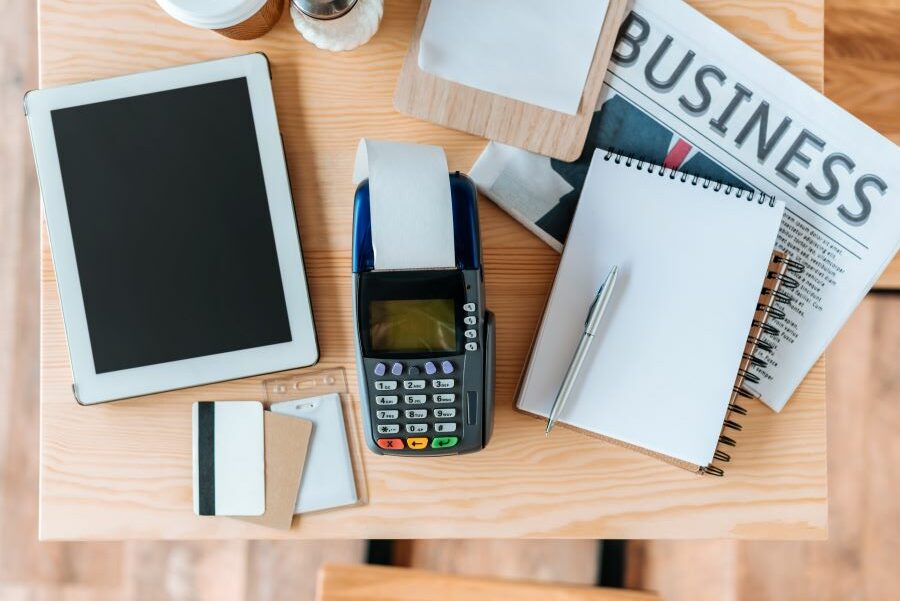
Alternatively, a monthly contract with a merchant service provider can be more cost-effective for businesses with higher volumes of transactions. Through these contracts, businesses can lease card machines—be they countertop, portable, or mobile—which cater to the specific dynamics of their operation.
When trying to minimise costs on card machine fees, it’s prudent for business owners to seek providers that offer tailored rates. These should be presented in a transparent manner during the quoting process, ensuring there are no hidden costs. Additionally, selecting a provider known for dependable customer service and multiple support channels is instrumental in maintaining smooth operations and swiftly addressing any issues that may arise.
Steps to Set Up a Card Payment Solution for Your Business
Determine the Size and Type of Your Business: Assess whether you are running a small, medium, or large enterprise, as this will influence your card payment volume and the functionality required from a card machine.
Estimate Card Payment Volume: Evaluate your expected volume of card payments. This will help you decide whether a no-contract card reader or a monthly leased terminal is more economical for your business.
Review Internet Access: Make sure your business location has reliable internet connectivity, as this is essential for the smooth functioning of your card payment solution.
Identify Customer Preferences: Understand the preferred payment methods of your customers, as this will determine the type of card machine you need, whether it’s contactless, chip and PIN, or magnetic stripe.
Compare Features of Card Machines: Look for machines that offer fast transaction processing, strong security features, a user-friendly interface, stable connectivity options, and receipt printing, if required.
Select a Merchant Account Provider: Choose a provider that offers the type of card reader you need and one that aligns with your transaction fee budget.
Set Up the Card Reader: Once you’ve received your card reader from the provider, follow the instructions to set it up. This typically involves connecting it to your internet and configuring it with your merchant account.
Train Your Staff: Ensure that your staff is properly trained to use the card machine, including processing transactions, handling errors, and understanding security measures.
Frequently Asked Questions
What is a Card Payment Solution?
A card payment solution allows businesses to accept payments from customers using debit and credit cards. This can range from traditional card machines at a countertop to mobile card readers that pair with smartphones, offering businesses flexibility in how they collect payments.
How Do I Choose the Right Card Payment Solution for My Business?
Selecting the right solution involves considering your business size, expected payment volume, customer payment preferences, and operational mobility. For instance, a portable card machine may be best for businesses like restaurants, while a mobile card reader could suit mobile vendors or pop-up shops. Additionally, evaluate transaction fees, compatibility, and ease of use.
What Types of Payments Should My Business Accept?
To stay competitive, businesses should aim to accept a broad range of payments, including chip and PIN, magnetic stripe, and contactless options like NFC payments from smartphones and contactless cards. This ensures you can cater to all customer preferences.
What Are the Costs Involved with Card Payment Solutions?
Costs can include the purchase price of the card machine, transaction fees per payment, and potentially a monthly service fee, depending on your provider. Prices and fees vary significantly between providers, so comparing options is crucial.
Are There Card Payment Solutions Without Monthly Fees?
Yes, app-based card readers like SumUp Air, Zettle Reader, and Square Reader often have no monthly fees, charging only per transaction. This can be a cost-effective solution for businesses with lower transaction volumes or those seeking flexibility without long-term commitments.
By carefully evaluating your needs and the available options, you can choose a card payment solution that enhances your operational efficiency, keeps costs in check, and offers your customers a convenient and secure way to make payments.
Final Words
For small businesses and sole traders, the journey to integrating card payments into their operations doesn’t have to be daunting. By carefully considering their specific needs, customer payment preferences, and operational setup, they can identify the most cost-effective and functional card payment solution. Whether it’s the portability of mobile card readers like SumUp Air and Zettle Reader or the reliability of countertop devices, the key lies in balancing cost with functionality to enhance the customer experience and streamline transactions.
Remember, the choice of a card payment solution affects not just the ease of transactions but also the security of customer data and the overall efficiency of your business operations. As such, it’s essential to weigh factors such as transaction fees, equipment costs, compatibility with your business model, and the level of customer service provided by the merchant service provider.
